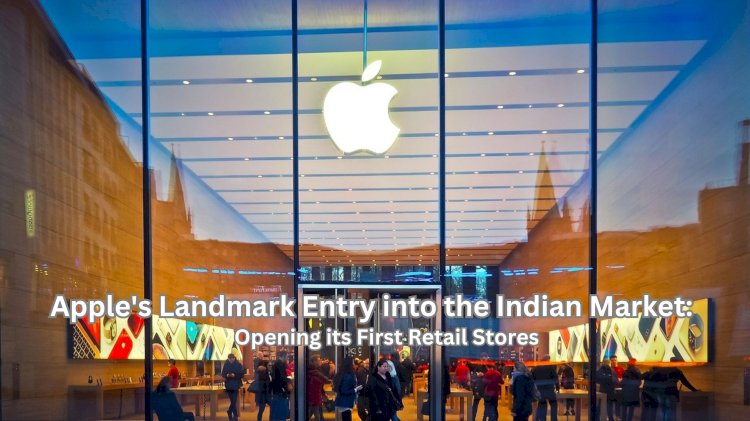Title: Apple's Landmark Entry into the Indian Market: Opening its First Retail Stores
Apple has opened its first retail stores in India, marking a significant milestone in the company's journey. The Mumbai store, called Apple BKC, is powered by renewable energy and offers the complete Apple ecosystem. Apple's second store in Delhi extends its retail reach. India's potential as a consumer market and a manufacturing hub presents opportunities and challenges for Apple. The company aims to overcome price sensitivity, leverage local manufacturing, and navigate regulatory changes to establish a strong retail presence in India.
By Shreya Rajvanshi Gangal

Apple, the global tech giant, has made a significant milestone in its journey by opening its first-ever retail stores in India. The move marks a crucial step for Apple in expanding its presence in the world's second-largest smartphone market and capitalizing on the country's potential as both a consumer market and a manufacturing hub. This article explores the key details and significance of Apple's entry into the Indian retail landscape.
Apple's First Retail Store in Mumbai
A Grand Opening and Tim Cook's Presence
Apple's first official retail store in India opened its doors in Mumbai, specifically at the Jio World Drive mall in the Bandra Kurla Complex. The store's opening was a momentous occasion, with Apple CEO Tim Cook personally welcoming customers as employees cheered and clapped. It was a testament to the company's commitment to the Indian market and its long-standing history in the country.
Unique Features and Sustainable Practices
The Mumbai store, known as Apple BKC, boasts several unique features and sustainable practices. Apple claims it to be one of its "most energy-efficient" locations globally, powered solely by renewable energy sources, including a dedicated solar energy system. The store's design incorporates handcrafted timber tiles, forming an aesthetically pleasing and environmentally conscious space for customers to explore Apple's diverse range of products.
Expanding Apple's Ecosystem
Apple BKC offers customers the complete Apple ecosystem, including iPhones, iPads, Apple Watches, MacBook laptops, Apple TVs, and various accessories. With a spacious layout spanning two floors, the store provides an immersive experience for customers to engage with Apple's innovative products and services. The store employs over 100 staff members who can communicate in more than 20 languages, ensuring a seamless customer experience.
Apple's Second Store in Delhi
Extending Reach to the Capital
Following the successful opening of the Mumbai store, Apple is set to open its second retail outlet in India's capital city, Delhi. This expansion highlights Apple's commitment to establishing a strong retail presence across the country. The store's location in Delhi is strategically chosen, considering the city's status as one of the top Indian markets for Apple products.
Catalyzing Premiumization in the Smartphone Market
Apple's entry into the Indian retail landscape is expected to boost the premium smartphone market. While Apple currently holds a modest 6% share of the Indian market, the rising middle class and its increasing purchasing power present an opportunity for growth. Counterpoint Research Associate Director Hanish Bhatia suggests that as more customers transition from basic cell phones to smartphones, Apple's position in India is likely to strengthen.
Apple's Journey in India: Opportunities and Challenges
India's Potential as a Consumer Market
India's vast population, rising middle class, and the increasing adoption of smartphones make it an attractive market for global brands like Apple. The country's demographic and economic trends indicate a shift towards higher-end smartphones, creating a favourable environment for Apple's premium devices. The Indian market's potential has prompted Apple to focus on expanding its retail presence and capturing a larger share of the market.
Price Sensitivity and Competition
One of the key challenges Apple faces in India is the price sensitivity of consumers. With the average salary for regular full-time workers in India being relatively low, the affordability of Apple products becomes a significant consideration for consumers. Competitors like Samsung and Chinese smartphone makers, Xiaomi and Vivo, dominate the market with more affordable options. Apple's premium pricing strategy requires careful positioning and marketing to attract Indian consumers.
Manufacturing in India
To address price concerns and strengthen its presence in India, Apple has been ramping up its manufacturing operations in the country. The company began producing iPhones locally in 2017, and it has since expanded its manufacturing capabilities. By manufacturing in India, Apple can benefit from cost efficiencies and potentially offer more competitive pricing to Indian consumers.
Regulatory Changes and Retail Expansion
Until recently, foreign retailers like Apple faced restrictions on setting up physical stores in India. The Indian government's decision to ease these restrictions in 2019 opened the door for Apple to establish its retail stores in the country. The opening of the Mumbai and Delhi stores reflects Apple's commitment to bringing its products "under one roof" and providing a personalized retail experience to Indian customers.
Conclusion
Apple's entry into the Indian retail market through the opening of its first physical stores in Mumbai and Delhi represents a significant milestone for the tech giant. The move showcases Apple's determination to tap into the vast potential of the Indian market, both as a consumer base and a manufacturing hub. By establishing a strong retail presence in India, Apple aims to capture a larger share of the premium smartphone market and strengthen its position in one of the world's fastest-growing economies.
What's Your Reaction?



















